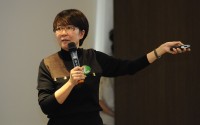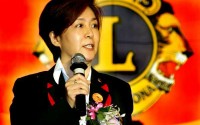China Charity Fair 2012 Report-2
 This post is continued from the previous report about feedback on the first national charity fair in China during July 12-14 in Shenzhen.
This post is continued from the previous report about feedback on the first national charity fair in China during July 12-14 in Shenzhen.
Academia were overall satisfied
In an article from NanFang Daily, people from academia were quoted to consider this national charity fair as a milestone in Chinese charity development. YangTuan, a senior researcher at Chinese Academy of Social Science and Chief Editor of Chinese Philanthropy Blue Book, pointed out at the release conference for the 2012 Blue Book: China is at a turn of an era of social transformation, and charity could be an important breach.” The charity fair seems to have provided an open platform for communications and exchanges.
10 summit meetings were held during the 3-day event, where people from all sectors discussed topics on where charity is leading and how charity can play a larger role in the society.
At a meeting featuring New Order in Charity and New Media’s Role, He DaoFeng, Executive Director of China Foundation for Poverty Alleviation, called the past year (2011 ) a year of rising consciousness of civil society among individuals, evidenced by the sweeping success of Free Lunch Campaign, the scrutiny on China Red Cross Society and Apple’s sweatshop from the public, all enabled by the spread of social media. He thought these social changes would require a new thinking on philanthropy and collaboration.
His view was echoed by Yang Tuan from another meeting, who was very encouraged by the increasing participation from citizens in their social life. But at the same time, she also reminded that public scrutiny presented challenges to all nonprofit organizations, whether they were public charities or private foundations, whether they had government ties or not. According to Yang Tuan, charity organizations should all speed up their growth so that they would not be left behind in the current bottom-up social movement.
Government’s role in the social sector is always a hot topic, and it was no exception at the charity fair. XuYongGuang, Chairman of Narada Foundation and outspoken opinion leader, again advocated an overhaul system change, which he called Top-Level Design, supported by wide participation from the society. More specifically, he thinks government should withdraw from monopoly of charitable resources and allow grassroots social organizations to flourish.
Liu RunHua, deputy director of GuangDong Province Social Work Committee, may not speak for the central government, but could well represent the rationale for the progressive regulations released in GuangDong province earlier this year. He has observed that the government is still taking a “planned-economy” mentality in the social sector while “market-economy” is widely adopted in economic sector. Under this mentality, government is trying to control every aspect of the society and to perform a one-man show by setting up its own agencies to provide all public service. He proposed government redefine its role and focus on providing a supportive environment for social organizations to deliver social services.
Opinions expressed at all these summit meetings may not sound new to those who follow Chinese social sector. However, as one meeting participant described, “The fact that seeing people and organizations from all over the country gather together in this city itself is a very lifting experience. I was encouraged by the positive energy around and this fair makes us believe the future can be brighter.”
Corporations are both confused and confusing.
 Although corporations took the whole exhibition hall No.7, where booths were often set up elaborately, corporation exhibitors were mostly lost at the expo.
Although corporations took the whole exhibition hall No.7, where booths were often set up elaborately, corporation exhibitors were mostly lost at the expo.
A SOE (State Owned Enterprise ) representative didn’t see the point of coming for the fair: ” The major responsibility of a corporation is to run the business well. Charity is not the primary goal of a corporation.” He also admitted that they went to the fair mostly because the State-owned Assets Supervision and Administration Commission asked them to do so.
For many other corporate exhibitors, they seemed to have taken this exhibition as an opportunity to showcase their own CSR projects and to promote their business, and were not aware of the organizer’s intention of matching corporate resources with nonprofit projects. Many people from NGO field came to the fair hoping to get funding, and only ended up confused, because corporate exhibitors had no intention to communicate with NGOs.
When asked why corporate exhibitors didn’t seem to be engaged at the fair, Yang ZhongRen, Chief CSR Officer at Intel China commented, ” CSR practice often goes through three stages: the first stage is traditional giving programs; the second stage is to integrate corporate’s resources – financial, talent, technology, expertise, service – with social innovation; and the third stage is to collaborate with other sectors to address social problems, such as educational inequality, climate changes, etc. However, not many corporates have reached the second stage yet.”
Despite of the overall confusion around corporate exhibitors, some entrepreneurs are taking actions to play a more responsible role in the society. Mangrove Wetland Foundation, co-founded by a group of entrepreneurs, was announced to establish during the charity fair. Wang Shi, the chairman of Vanke Co, Ltd, will chair the foundation. He openly advocated that corporates should lend more support to the social sector, as social organizations are by far the weakest in the society compared with government and enterprises.
References ( in Chinese )
[space][space]



